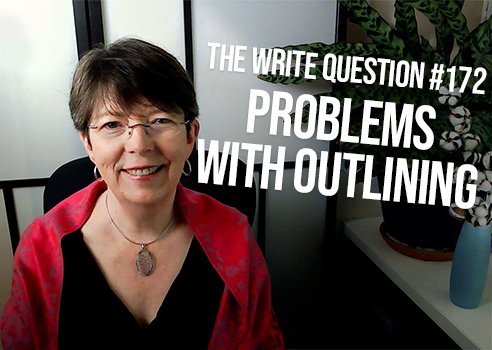Viewing time: 4 mins 31 secs
The Write Question is a weekly video podcast about writing that I started in 2017 and that ran, more or less weekly, until April 2022. This is a republication of issue #172, which addresses the problem with outlining. The post first ran on Jan. 29/21.
Transcript:
When is the problem with outlining? That’s the topic I’m addressing today in The Write Question. I’m Daphne Gray-Grant, the Publication Coach, still in pandemic mode.
I have a question from Alec Gildon, a writer based in Kuruwita, Sri Lanka. Here’s what he’s asked by email….
“I watched the interview you did for the Coursera course Learning How to Learn. There you advised not to outline because it causes us to use our focused brain. But outlining is important—especially for authors who have to tackle a complex plot. So, what do you suggest that fiction writers do? I wonder if summarizing the story might be a good alternative.”
Thanks for your question, Alec. For people who didn’t see my interview, let me begin by summarizing the problem with outlining.
First, it’s boring. Second, it imposes too great a sense of duty and obligation on the writer. In other words, it’s the opposite of fun and interesting.
But finally, my biggest problem is that I think it forces writers into the linear, logical parts of their brain. Now most of us living in Western society LOVE that area of our brains. We’re really comfortable with it. But the big problem is that it’s so predictable.
If you want to come up with new and creative ideas for your novel, then you want to be lodged in the creative part of your brain. This is why I strongly endorse mindmapping. See a link to all my blog posts and videos on mindmapping in the shownotes, below.
To address your specific question, Alec, most fiction writers can be divided into two categories: planners and pantsers. The planners are the ones who need a really good idea about exactly where their plot is going to go — before they write a word. And the pantsers are those content to “fly by the seat of their pants” and see where the characters take them.
If you’re worried about not having an outline, Alec, I’m going to guess that you’re a planner. But let me tell you something important: there’s a big difference between plotting and outlining. Yes, you will want to plot in advance, but you don’t need to use an outline to do that.
To plot, ask yourself some questions: WHAT do you — or your characters — want to happen in your story? WHEN does it need to happen? WHY did it happen? Essentially, by asking questions like What, When, Why? you can become like a newspaper reporter for your own story.
You don’t need to write those answers as an outline. Instead, do it as a mindmap. Then write your first draft.
Once you’ve finished that first draft, and you’re ready to start editing, THAT’s the time to consider outlining. I always recommend doing outlines retrospectively — after you’ve finished writing.
When you write, you want to be creative. When you edit, you want to be linear and logical. The retrospective outline can be a little like an engineering plan. It will show you whether your structure is working and whether everything is in the right place.
If you’re working on the type of book where timing is exceptionally important — I’m thinking about tightly-plotted murder mysteries here — then you might also consider preparing a formal timeline for yourself. This will help prevent you from making mistakes relating to chronology.
Finally, let me wrap up with a quote from the wonderful American novelist Anthony Doerr. He’s the author of one of my all-time favourite books, All the Light We Cannot See.
“Fiction writing is just an excuse to go discover interesting things.”
Alec, when I advise people not to outline before writing, many people think I’m suggesting that they avoid outlining altogether. This is not true! I simply suggest that you do the outlining later, after you’ve finished writing.
*
If you’d like to learn more about how to make writing a happier and more rewarding process, check out my latest book Your Happy First Draft. I don’t sell it in bookstores or via Amazon. The only place to buy it is on my website, link on the screen below and in the show notes.


